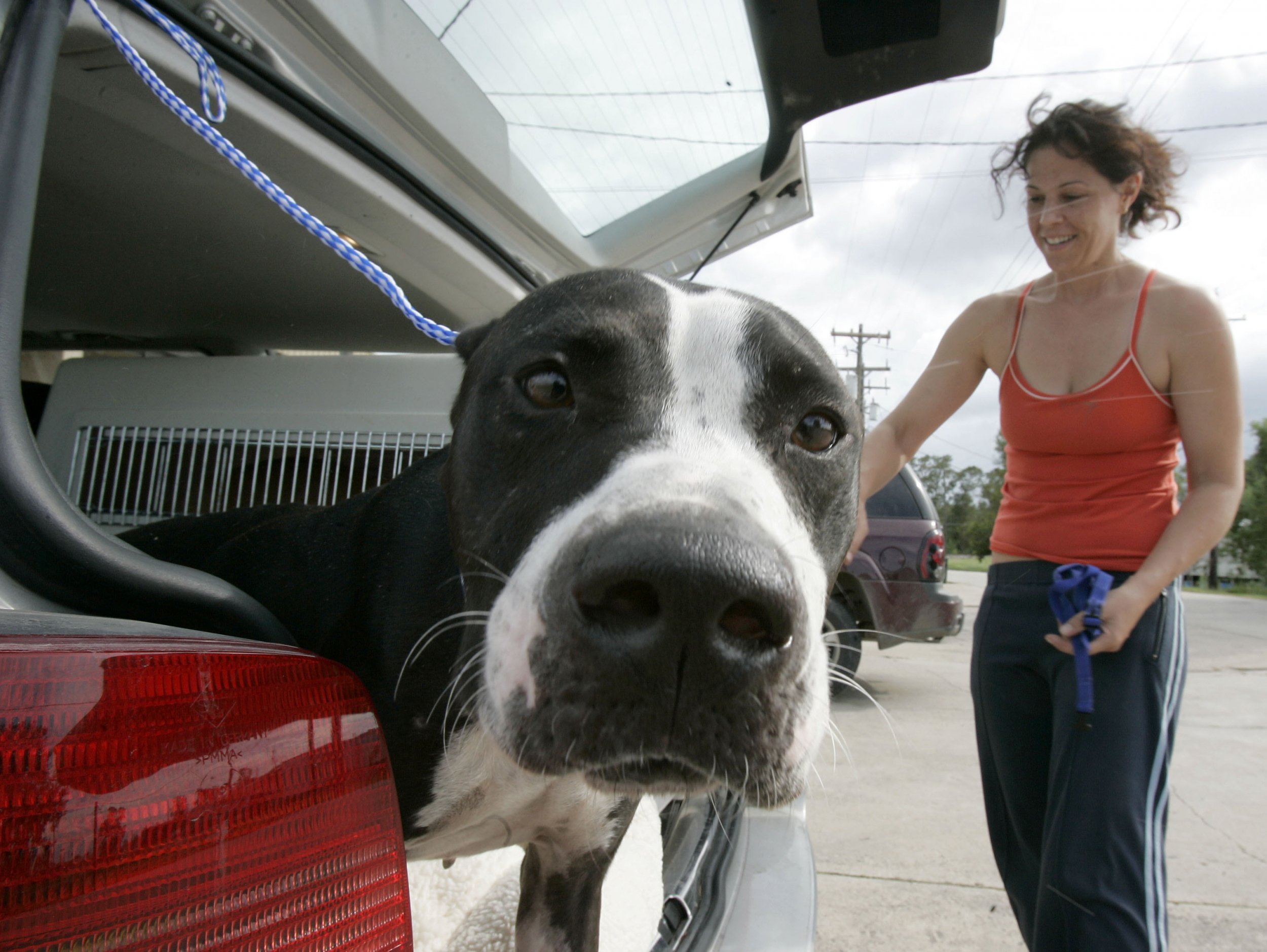
Updated | While controversy continues to swirl over the safety of dogs labeled as "pit bulls"—a loose term that is in fact not an actual breed but applies to a number of types of dogs—a new study has indicated that many of these dogs' lives could be saved if shelters stopped using "pit bull" breed labels on kennel cards.
Dogs labeled as "pit bulls" are seen as less approachable, less trainable, more aggressive, less intelligent, less friendly and overall less adoptable than Labrador retrievers and border collies, according to the new Arizona State University study, titled "What's in a Name? Effect of Breed Perceptions and Labeling on Attractiveness, Adoptions and Length of Stay for Pit-Bull-Type Dogs."
The study, conducted by Lisa M. Gunter and her colleagues, also showed that photographs and videos of dogs labeled as "pit bulls" were less attractive to potential adopters than those of dogs that looked exactly like them but had different breed labels. Once those labels were removed, the "pit bulls" were seen as just as attractive as, or even more so than, the look-alikes.
Because "pit bulls" have long had a reputation of being bullies and vicious attack dogs, a number of foundations and websites have sprung up to defend them, such as the Animal Farm Foundation, BADRAP, Bless the Bullys and Pit Bulls Against Misinformation.
"Pit bull" has become an umbrella term that covers any dog with a muscular build and big head. The true breeds most commonly labeled as "pit bulls" are the American pit bull terrier, American Staffordshire terrier and Staffordshire bull terrier, but many dogs labeled as "pit bulls" don't have any DNA belonging to these breeds.
"There is no legal definition of 'pit bull,' there is no kennel club definition of 'pit bull,' and there is no genetic definition of 'pit bull,'" says Stacey Coleman, the executive director of Animal Farm Foundation. "To be a breed of dog, the dog needs to be born of a close and coherent gene pool. We put 'pit bull' in quotes because there is no real definition of what a 'pit bull' is. There is a lot of folklore and opinion about what is and isn't a 'pit bull,' but there is no agreed-upon definition."
Among the folklore surrounding "pit bulls" is that they have the strongest bite force. According to an article on SFGate, bite data is skewed because it doesn't take into account the popularity of the type of dog, and thus one type may account for more attacks than another simply because it is more common. Gunter's study shows that "pit bulls" are the most common type of dog in shelters, and an article on Vetstreet says that the American pit bull terrier is a top-three breed in 28 states. The American Veterinary Medical Association says dog-bite statistics are not really statistics, and they do not give an accurate picture of dogs that bite.
According to the American Temperament Test Society, 86.8 percent of the American pit bull terriers it tested had a good temperament, a rating that put them above 121 other breeds of dogs, including golden retrievers, beagles and cocker spaniels.
Still, the stereotype persists, and Gunter's study shows the label keeps "pit bulls" in shelters far longer than other breeds.
When breed was included on the kennel card, only 52 percent of entering "pit bulls" were adopted, compared with 64 percent once the breed information was removed. This was mirrored by a 12 percent reduction in euthanasia of pit-bull-type dogs. "Pit bulls" remained in the shelter over three times longer than their look-alikes when labels were applied.
"However, when asked to rate photographs of these same dogs without breed labels," Gunter wrote in the study, "we found no difference in how attractive photographs of these two groups of dogs were seen by potential adopters. This suggests that the disparity in how long the dogs remained at the shelter waiting for adoption may have been influenced in part by the perception of the label."
The removal of breed information also benefited other working and herding breeds: The adoption of mastiffs increased 15 percent, while those of Dobermans rose 12 percent and boxers went up 11 percent.
However, it's unlikely that most shelters will stop the labeling practice.
Ken Foster, a community dog program coordinator for Animal Care Centers of NYC, told Newsweek that people expect breed labels and most of the inventories or databases shelters use require breed labels.
The "pit bull" stereotype may not be the only reason these dogs are in shelters longer than other breeds. Many states have breed-specific legislation that keeps people from owning a certain type of dog if it is considered dangerous, and many insurance companies won't insure your home or pets if you own "pit bulls," rottweilers or wolf hybrids.
Coleman urges people to stop judging dogs this way: "We need to stop making generalizations about dog breeds. Dogs are pretty awesome, so when a dog does something that's pretty awesome, it's because it's a dog, not because it's breed X, Y or Z. We need to start looking at the individuality of dogs, start making really accurate statements about who our particular dog is and how great dogs are in general and let all those stereotypes and generalizations about breeds go out the window."
Correction: An earlier version of this article incorrectly stated that "pit bulls" and some other breeds lock their jaws and shake while biting down. Scientists say it is anatomically impossible for dog breeds to lock their jaws, and whether a dog chooses to shake while biting down is unrelated to pedigree.
Uncommon Knowledge
Newsweek is committed to challenging conventional wisdom and finding connections in the search for common ground.
Newsweek is committed to challenging conventional wisdom and finding connections in the search for common ground.
About the writer
To read how Newsweek uses AI as a newsroom tool, Click here.








